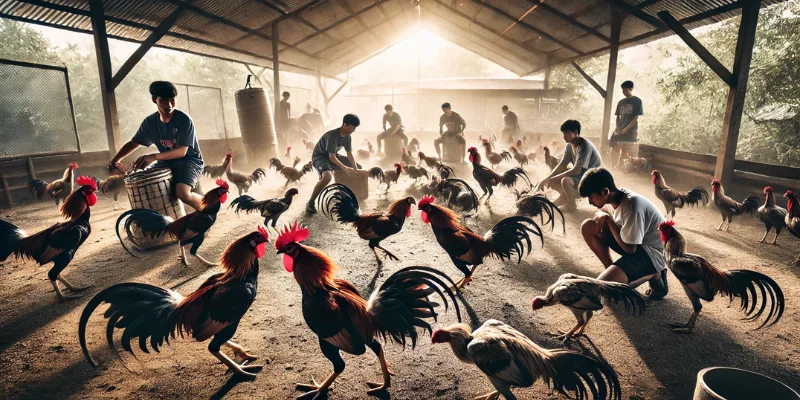
Key Government Bodies Involved in Sabong Regulation
In recent years, online sabong has seen massive growth in the Philippines. While it has opened new opportunities for breeders like myself, it has also brought more government oversight to ensure fair play, safety, and transparency. As a professional rooster breeder, I’ve seen firsthand how these regulations impact the sabong industry, from breeding to matches. In this article, I’ll walk you through the key government bodies involved in regulating online sabong, how their roles affect the industry, and what this means for breeders, trainers, and enthusiasts.
PAGCOR (Philippine Amusement and Gaming Corporation)
PAGCOR is at the center of online sabong regulation. This government agency is responsible for overseeing all forms of gambling in the Philippines, including online cockfighting. Here’s a breakdown of its role:
- Issuing Licenses: PAGCOR grants licenses to online sabong platforms, ensuring they operate legally. Without PAGCOR’s approval, no platform can host online matches.
- Regulating Fair Play: They monitor online sabong activities to ensure fairness. This means checking the integrity of matches and ensuring that betting is done in a transparent manner.
- Revenue Collection: PAGCOR collects taxes and fees from online sabong operators. A portion of this revenue goes back to the government, funding essential services.
For breeders like me, PAGCOR’s regulation is essential because it ensures the legitimacy of online sabong, attracting more participants and breeders to the sport. Compliance with PAGCOR’s standards gives both players and breeders confidence in the system, making the sport safer and more attractive for all.
Department of Interior and Local Government (DILG)
While PAGCOR oversees the national regulation of online sabong, the DILG works closely with local government units (LGUs) to implement these laws at the community level. Their responsibilities include:
- Monitoring Local Sabong Arenas: Although online sabong is growing, many traditional cockfights still take place in local arenas. The DILG ensures that these matches comply with both national and local laws.
- Enforcing Sabong Regulations: DILG works with LGUs to enforce sabong laws, especially in areas where illegal betting or unsanctioned matches may be occurring.
For breeders, the DILG’s role is crucial because it ensures that we have safe and legal venues for live cockfights.
National Bureau of Investigation (NBI) and Philippine National Police (PNP)
The NBI and PNP play vital roles in enforcing laws related to illegal online gambling and unsanctioned sabong events. Their duties include:
- Cracking Down on Illegal Operators: They work to close down platforms that do not have PAGCOR licenses. This keeps the industry clean and ensures all participants are playing under fair rules.
- Fighting Fraud: Both agencies investigate cases of fraud, such as match-fixing, rigged games, or illegal betting. Their actions help maintain the integrity of the sport.
As a breeder, I appreciate the PNP and NBI’s involvement in protecting our industry from illegal activities. A clean, legal environment allows breeders to thrive, knowing that their hard work will not be overshadowed by fraud or illegal gambling rings.
 Online Sabong Bureau of Animal Industry (BAI)
Online Sabong Bureau of Animal Industry (BAI)
Though the BAI is not directly involved in gambling regulation, it plays an important role in ensuring that the roosters used in online sabong are treated ethically and are in good health. Their responsibilities include:
- Health Certifications for Roosters: Before a rooster can participate in a sabong match, it must pass health checks from the BAI. This ensures that only healthy animals are allowed to fight.
- Enforcing Animal Welfare Laws: The BAI ensures compliance with animal welfare standards, which are becoming more relevant as public concern for animal rights grows. They ensure roosters are bred and trained in humane conditions.
For a breeder like me, BAI’s role is crucial. Ensuring that roosters are in top health not only keeps the animals safe but also leads to better performance in matches. Maintaining ethical breeding practices aligns with BAI’s standards and promotes a positive image of the sport.
Anti-Money Laundering Council (AMLC)
Given the huge sums of money involved in online sabong betting, the AMLC plays an essential role in preventing illegal financial activities such as money laundering. Their responsibilities are:
- Monitoring Financial Transactions: AMLC ensures that large financial transactions, particularly in online betting, are legitimate and transparent.
- Preventing Illegal Betting Schemes: They also investigate unusual betting patterns to detect and prevent money laundering or other illicit activities.
For breeders, AMLC’s involvement ensures that money flowing into the sport is legitimate, which helps sustain a cleaner and safer industry. Financial transparency promotes trust among breeders, bettors, and operators, which benefits the entire sabong community.
Local Government Units (LGUs)
While the DILG provides national oversight, local government units (LGUs) have a direct hand in regulating sabong at the community level. Their responsibilities include:
- Issuing Permits for Local Matches: LGUs are responsible for granting permits for sabong events held in their jurisdictions. This includes both live and online matches.
- Enforcing Safety Standards in Arenas: LGUs ensure that sabong arenas adhere to safety standards for both participants and spectators.
As a breeder, it’s important to collaborate with LGUs to make sure that our local events are well-regulated and comply with all necessary safety standards. These local matches often serve as training grounds for roosters that will later participate in online sabong events, so maintaining good relations with LGUs is vital.
Department of Finance (DOF)
The DOF oversees the financial policies that affect online sabong operators, particularly in terms of taxation. Their responsibilities include:
- Tax Collection: The DOF, along with PAGCOR, ensures that the government collects its fair share of taxes from online sabong operations.
- Regulating Online Payment Systems: They work with financial institutions to ensure that online payments for bets and other transactions are secure and regulated.
For breeders, the DOF’s role ensures that the industry remains financially viable. Tax revenues generated from online sabong contribute to the economy, which in turn supports the industry’s growth.
How Government Regulations Impact Breeders
As a breeder, I’ve observed how government regulations influence not only online sabong platforms but also how roosters are bred, trained, and prepared for matches. Here are some key impacts:
- Stricter Compliance for Rooster Health: Government health checks ensure that only roosters in prime condition can compete, raising the standards for breeders.
- Economic Opportunities for Breeders: With regulated platforms, more people are willing to invest in the sport, creating more demand for high-quality gamefowl.
- Financial Transparency: With AMLC and PAGCOR’s involvement, breeders have peace of mind knowing that prize money and payments are handled legitimately.
These regulatory frameworks create a safer, more sustainable environment for breeders and the entire sabong community. As a breeder, understanding these regulations allows me to better prepare my roosters and operate within legal parameters.
 Tips for Breeders to Comply with Online Sabong Regulations
Tips for Breeders to Comply with Online Sabong Regulations
As a breeder, it’s crucial to understand and comply with all the regulations that govern online sabong. Here are some practical tips:
- Stay Updated on Health Standards: Always keep your roosters in peak health to meet the Bureau of Animal Industry’s standards. Regular veterinary checks and proper nutrition are key.
- Ensure Legal Participation: Work only with licensed online sabong platforms to avoid legal complications.
- Follow Ethical Breeding Practices: Ensure that your roosters are bred and trained humanely to comply with animal welfare laws. This not only keeps you compliant but also boosts your reputation as a breeder.
These practices ensure that you are not only breeding champions but also contributing to a well-regulated and ethical sabong industry.
Online Sabong Regulation in the Philippines
Looking ahead, government regulations will continue to shape the future of online sabong. We can expect:
- Stricter Enforcement of Animal Welfare: As public concern for animal rights grows, expect more stringent guidelines on breeding and fighting conditions.
- Enhanced Technology for Monitoring: The government may implement more advanced technologies, like AI and blockchain, to monitor matches and betting activities.
As a breeder, these future changes will likely push us to innovate our practices. We need to embrace technology and maintain the highest standards in breeding and training roosters.
Impact of Recent Legislative Changes on Online Sabong
As a breeder who has dedicated my life to raising roosters for sabong, I’ve seen the sport evolve dramatically in recent years. Online sabong has changed the game entirely, allowing more people to participate from the comfort of their homes. However, this shift to online platforms has also attracted increased government attention, leading to new regulations and laws that affect how platforms operate. As a breeder, understanding these legislative changes is crucial, as they impact not only the sabong platforms but also the entire ecosystem, including breeders, trainers, and enthusiasts.
Recent Legislative Changes
Over the past few years, the Philippine government has passed several laws aimed at regulating the online sabong industry. These regulations focus on everything from licensing platforms to ensuring transparency and fairness in betting. The rise in online gambling, including sabong, has prompted lawmakers to take a closer look at this booming industry.
Understanding these laws is critical for everyone involved in sabong, especially for breeders like myself. We need to know how these rules affect the platforms we work with, the matches our roosters participate in, and the future of the sport.
Republic Act No. 11346 and Online Sabong
One of the key legislative changes that impacted sabong was Republic Act No. 11346, which initially focused on increasing taxes on tobacco products but also included provisions related to gaming activities, including sabong. This law had a ripple effect on online sabong platforms, especially in terms of:
- Increased Taxation: Platforms now face higher taxes, which impacts their revenue and ability to offer competitive prize money.
- Tighter Reporting Requirements: Platforms are required to provide more detailed financial reports to the government, ensuring that all bets and earnings are properly taxed.
For breeders, this increased oversight means we need to be more cautious when partnering with platforms. We must ensure that the platforms we work with are compliant with the law, as non-compliance could lead to penalties or even shutdowns, which would affect our participation in matches.
The E-Sabong Licensing Act
In response to the growing popularity of online sabong, the government introduced the E-Sabong Licensing Act. This law specifically targets online sabong platforms and lays out clear guidelines for their licensing and operation. The key aspects of this legislation include:
- Strict Licensing Requirements: Platforms now have to undergo a rigorous licensing process overseen by the Philippine Amusement and Gaming Corporation (PAGCOR).
- Mandatory Fair Play Mechanisms: The law requires platforms to implement systems that ensure fairness in both matches and betting.
- Betting Limits: To prevent excessive gambling, the E-Sabong Licensing Act introduced betting limits for individual players.
As a breeder, this law gives me confidence that the platforms my roosters compete on are legitimate and fair. It also means that there is a more stable environment for online sabong, as licensed platforms are less likely to face sudden closures or legal issues.
AMLA (Anti-Money Laundering Act) Amendments on Online Sabong
The Anti-Money Laundering Act (AMLA) was amended to include online gambling, including online sabong, in its scope. This has several implications for the industry:
- Enhanced Financial Scrutiny: Online sabong platforms are now required to report large transactions to the Anti-Money Laundering Council (AMLC). This is to prevent the platform from being used for illegal financial activities.
- Compliance with International Standards: By bringing online sabong under the AMLA, the Philippines is aligning its regulations with international anti-money laundering standards.
For breeders, the AMLA amendments mean that we need to be more mindful of how we receive payments from sabong matches. Platforms are now required to report high-value payouts, which could potentially slow down the payout process but also ensures transparency.
Sabong Act of 2023
One of the most recent laws affecting online sabong is the Sabong Act of 2023. This law was introduced to further regulate both live and online sabong. Some of its key provisions include:
- National Standard for Online Sabong Platforms: The law creates a uniform standard that all platforms must follow, including guidelines on security, fair play, and prize distribution.
- Consumer Protection Measures: The law includes new rules to protect players from fraudulent platforms and illegal operators. This has resulted in stricter background checks and tighter monitoring of platform activities.
- Promotion of Ethical Breeding: The Sabong Act also emphasizes animal welfare, promoting ethical breeding and care for roosters used in sabong matches.
For breeders like myself, this law is a double-edged sword. On the one hand, it promotes ethical practices, which helps improve the image of the sport. On the other hand, it introduces more stringent regulations that breeders must adhere to, especially in terms of animal welfare.
 Stricter Penalties for Illegal Online Sabong Operators
Stricter Penalties for Illegal Online Sabong Operators
Another significant change in recent years is the government’s crackdown on illegal online sabong platforms. The penalties for operating without a license have become much harsher. These include:
- Hefty Fines: Operators caught running illegal platforms face massive fines, sometimes in the millions of pesos.
- Jail Time: In some cases, individuals involved in illegal online sabong operations can face jail time.
- Permanent Bans: Operators who are found guilty of running illegal platforms may be permanently banned from ever applying for a legal license.
As a breeder, I always ensure that the platforms I work with are licensed and compliant with the law. Working with illegal operators not only puts our livelihoods at risk but also jeopardizes the sport as a whole. This new enforcement makes it even more critical to vet platforms thoroughly before participating.
Local Government Ordinances on Online Sabong
In addition to national laws, local government units (LGUs) also have a hand in regulating online sabong, particularly in terms of venue permits and local betting regulations. Some LGUs have passed ordinances to further control the sport within their jurisdictions, focusing on:
- Permit Requirements for Local Arenas: Even if matches are streamed online, they may still take place in local arenas, which require LGU permits.
- Local Betting Taxes: LGUs may impose additional taxes on betting within their jurisdictions, further affecting how much profit platforms and breeders can make.
As a breeder, it’s important to stay informed about local regulations, especially when my roosters participate in live matches that are streamed online. Local ordinances can vary significantly from one area to another, and compliance is crucial to avoid any legal complications.
Taxation Changes in Online Sabong
One of the most critical aspects of recent legislative changes is the taxation policy on online sabong. The government has been keen on increasing its share of revenues from this booming industry. These changes include:
- Higher Platform Taxes: Online sabong platforms are now taxed at a higher rate, which affects how much they can invest in prize pools and operations.
- Player Winnings Tax: Taxes are now imposed on player winnings over a certain amount, much like other forms of gambling.
- Breeder Income Taxation: Breeders who receive substantial earnings from matches, whether through rooster sales or prize winnings, are also subject to stricter tax regulations.
For breeders like me, taxation changes mean we need to be more mindful of our earnings and ensure we comply with tax laws. Keeping detailed records of income from rooster sales and prize money is now more important than ever to avoid penalties.
Implications for Rooster Breeders in the New Regulatory Environment
The recent legislative changes have several direct implications for breeders, including:
- Increased Costs for Compliance: Breeders may face higher costs due to the need for more rigorous health checks and certifications for their roosters.
- Ethical Breeding Practices: With the new emphasis on animal welfare, breeders must now adopt more humane and ethical practices in raising and training roosters.
- Fewer Platforms to Choose From: With stricter licensing requirements, some platforms may be unable to continue operating, reducing the number of options for breeders to partner with.
As a breeder, it’s important to adapt to these changes by maintaining high standards in both breeding and training. These regulations can also serve as an opportunity to showcase the quality of our roosters and our commitment to the sport’s future.
Preparing for the Future: What’s Next for Online Sabong Regulations?
The legislative landscape for online sabong is still evolving. Here’s what breeders like myself can expect in the coming years:
- More Focus on Responsible Gambling: The government may introduce even stricter measures to ensure responsible gambling practices, which could affect how bets are placed and how much players can wager.
- Technological Innovations in Compliance: Platforms may be required to adopt more advanced technologies, such as blockchain, to enhance transparency and prevent fraud.
- Greater Collaboration Between Breeders and Platforms: As regulations become stricter, platforms and breeders will need to work more closely to ensure compliance, from health certifications to match transparency.
For breeders, staying ahead of these changes will be key to thriving in the industry. By aligning with legal platforms and adopting best practices, we can ensure that our roosters remain competitive and that the sport continues to grow sustainably.
 Taxation and Revenue Implications of Online Sabong
Taxation and Revenue Implications of Online Sabong
As a dedicated breeder of roosters for sabong, I’ve seen how the landscape of the sport has evolved, particularly with the rise of online platforms. With the growth of online sabong, the government has stepped in to regulate and tax the industry. Taxation plays a vital role in shaping the future of online sabong, not just for platforms and operators but also for breeders, players, and the state’s economy. In this article, I’ll break down how government-imposed taxes on online sabong are affecting the industry, and how these changes impact breeders like me.
Online sabong has become a significant source of revenue for the Philippine government, prompting new taxes and fees.
Key Taxes Imposed on Online Sabong:
- Platform Licensing Fees: Operators must pay significant fees to obtain and renew licenses.
- Betting Taxes: A percentage of all bets placed on online sabong platforms goes to the government.
- Winnings Taxes: Large winnings by players are also subject to taxation.
These taxes are crucial for ensuring that online sabong operates in a legal and regulated environment. However, they also pose challenges for operators and impact their ability to offer competitive betting and prize structures.
Online Sabong Platforms’ Revenue
Government-imposed taxes have a direct effect on the revenue of online sabong platforms. Taxes on earnings, winnings, and transactions increase the cost of running these platforms, which can lead to several significant outcomes:
- Reduced Profit Margins for Operators: Operators must pay hefty taxes, which reduces their overall profits. This forces them to carefully balance their expenses, including payouts to players and investments in platform technology.
- Increased Betting Fees: To cover their tax liabilities, some platforms have raised their betting fees or reduced payouts, which can discourage bettors from participating. This, in turn, may lead to lower player engagement.
For breeders like me, these changes in platform revenue can impact how much we earn from matches. If platforms struggle to maintain profitability, they may cut back on prize pools or the number of matches they host, affecting our livelihood.
Taxation’s Role in Regulating Online Sabong
Taxes are not just about generating revenue for the government. They are also a tool for regulating the online sabong industry. By imposing taxes, the government can exert control over the number of platforms that operate, ensuring that only legitimate and well-capitalized operators stay in the market.
Key Regulatory Functions of Taxes:
- Filtering Out Illegal Operators: The cost of taxation makes it harder for illegal or fly-by-night operators to thrive. Only well-established, legal platforms can survive, ensuring a cleaner and safer environment for participants.
- Encouraging Compliance: Tax requirements force operators to maintain proper financial records and be transparent in their operations, leading to a more trustworthy industry.
For breeders, these regulations help ensure that the platforms we work with are legitimate. It’s crucial that we trust the operators who handle matches and distribute prize money, knowing they are compliant with the law and are financially sound.
Effects of Increased Taxation on Sabong Operators
The rise in taxes on online sabong platforms has placed new financial burdens on operators, affecting their business strategies. Some key ways increased taxation has impacted operators include:
- Need for Financial Restructuring: Many operators have had to adjust their business models to accommodate higher taxes. This might involve cutting costs in areas like platform development, marketing, or even breeder payments.
- Shifts in Prize Payouts: To maintain profitability, some platforms have reduced prize payouts, which can directly affect the earnings of breeders and participants.
- Longer Licensing Processes: With higher taxes come more complex regulatory requirements, which can delay the licensing process for new operators. This limits competition and reduces the number of platforms available for breeders and bettors to work with.
For breeders, the ripple effects of taxation on operators mean fewer opportunities and potentially lower earnings. However, it also means that the platforms that survive are more reliable and compliant with the law.
Revenue Implications for the Philippine Government
The taxation of online sabong has proven to be a lucrative source of revenue for the Philippine government. This influx of funds supports a range of public services and initiatives, contributing to the country’s economic stability.
Key Revenue Streams from Online Sabong:
- Betting Taxes: A portion of every bet placed on an online sabong match goes directly to the government. This provides a steady income stream, especially as online sabong continues to grow in popularity.
- Operator Licensing Fees: The high cost of obtaining a license to operate an online sabong platform ensures that only serious businesses can enter the market. These licensing fees are another significant source of revenue for the state.
For breeders, this revenue generation is important because it means that the government is likely to continue supporting the legal and regulated growth of online sabong. As long as the industry provides tax income, the government will work to maintain its success, ensuring continued opportunities for breeders.
Local Government Taxation
In addition to national taxes, local governments also impose taxes on online sabong, especially when matches take place in physical arenas or when platforms are based in specific regions. Local government taxation can include:
- Arena Permits and Fees: Local governments charge for permits to host live matches that are streamed online, contributing to the local economy.
- Local Betting Taxes: Some LGUs impose additional taxes on betting activity, which further increases the cost for players and operators.
For breeders, these local taxes can affect the availability of matches and arenas. If local governments impose too many fees, it may become less profitable to host matches in certain areas, limiting the opportunities for breeders to participate in competitions.
How Taxes Affect Breeder Earnings
As a breeder, my income is closely tied to the performance of my roosters in online sabong digital betting. Government-imposed taxes on platforms and winnings can impact how much I ultimately earn. Here’s how:
- Reduced Prize Pools: When platforms face higher taxes, they may reduce the amount of money they allocate to prize pools. This directly affects breeders, as we rely on prize money from winning matches to support our operations.
- Longer Payment Processing: Platforms are required to comply with strict tax laws, which can delay the processing of winnings. This means breeders and players may have to wait longer to receive their earnings.
While taxation is necessary to regulate the industry, it can present challenges for breeders, particularly when it reduces our potential earnings or delays payments.
Rooster Sales and Breeding Costs
Taxes on online sabong platforms also affect the demand for high-quality gamefowl, which in turn impacts breeders’ income. Higher taxation can lead to:
- Decreased Demand for Roosters: If online sabong platforms struggle to maintain profitability, they may reduce the number of matches they host, leading to less demand for roosters. This can hurt breeders who rely on selling gamefowl to operators and participants.
- Increased Breeding Costs: Breeders may need to raise prices to cover their own expenses, including taxes and fees. However, with fewer matches and reduced prize pools, it can be harder to sell roosters at higher prices.
For breeders like myself, finding a balance between maintaining high-quality breeding practices and adapting to market demand is key. We need to adjust our strategies to ensure that we remain competitive in an increasingly taxed and regulated market.
The Broader Economic Impact of Online Sabong Taxes
While taxes may present challenges for operators and breeders, they also have broader economic benefits. The revenue generated from online sabong taxation supports government programs and can even promote local economic growth.
Key Economic Benefits:
- Increased Government Revenue: The money collected from online sabong taxes helps fund public services such as healthcare, education, and infrastructure development.
- Job Creation: The legal online sabong industry creates jobs for platform developers, support staff, breeders, and event organizers. This economic activity benefits both local and national economies.
For breeders, this broader economic impact is important because it supports the growth of the industry. A stable economy leads to more players, more matches, and ultimately, more opportunities for breeders to earn a living.
Preparing for Future Taxation Changes in Online Sabong
The online sabong industry is still evolving, and so are its regulations. As the government continues to adjust its taxation policies, breeders, operators, and players must stay informed about these changes.
Tips for Breeders to Adapt:
- Stay Updated on Tax Laws: Keep up with new regulations and taxation policies to avoid legal issues. Understanding how taxes affect your earnings will help you plan your finances.
- Work with Licensed Platforms: Always partner with licensed, compliant platforms that adhere to tax laws.
- Diversify Your Revenue Streams: Consider offering additional services, such as training or consulting, to offset the potential decrease in match earnings due to increased taxation.
By preparing for future changes in taxation, breeders can ensure their long-term success in the online sabong industry.
Regulatory Challenges and Gaps in Online Sabong Oversight
As a breeder with deep roots in the sabong community, I’ve observed how the rapid rise of online sabong has brought about both new opportunities and challenges. While government regulations aim to create a legal framework for the sport, there are still gaps in oversight that can lead to potential problems. These regulatory challenges don’t just affect platforms and operators—they also impact breeders, players, and the overall sustainability of the sport.
These gaps create significant risks for all stakeholders in the industry, including breeders like myself. A lack of thorough oversight can undermine the legitimacy of the sport and damage the reputation of the platforms we rely on for competitions.
 Gambling Addiction in Online Sabong
Gambling Addiction in Online Sabong
One of the most significant regulatory challenges in online sabong is the issue of gambling addiction. With the convenience of placing bets from home, more people are getting involved in the sport, but this ease of access also increases the risk of problem gambling.
Key Gaps in Addressing Gambling Addiction:
- Lack of Comprehensive Player Protections: Currently, there are minimal requirements for online sabong platforms to implement safeguards against gambling addiction. Many platforms don’t have responsible gambling features like self-exclusion options, betting limits, or real-time monitoring of player behavior.
- Insufficient Public Awareness Campaigns: While gambling addiction is a well-known problem in other sectors, there’s a lack of targeted public awareness campaigns specifically addressing the risks associated with online sabong.
For breeders, the rise of problem gambling can have a ripple effect. As platforms face more scrutiny due to addiction issues, this could lead to tighter regulations or even restrictions that affect the number of matches held or the prizes offered. Understanding these risks helps breeders like me stay prepared for potential changes in the industry.
Ensuring Fair Play: The Need for Greater Transparency
Another major gap in online sabong oversight is ensuring fair play. However, current regulations often fail to enforce this adequately.
Specific Issues with Fair Play in Online Sabong:
- Lack of Independent Monitoring: There is currently no independent body that oversees the fairness of online sabong matches. While platforms may claim transparency, without third-party verification, there’s no guarantee that matches are not being tampered with.
- Unclear Guidelines for Breeder Involvement: As a breeder, I’ve noticed that there are no clear guidelines about how roosters should be trained or prepared for online matches. This creates a grey area, allowing for practices that may give certain breeders an unfair advantage.
To promote fair play, the government must introduce stricter guidelines for platform operations, including match transparency and the standardization of breeding practices.
Inadequate Technological Infrastructure for Monitoring
With the shift to online platforms, the use of advanced technology is essential to ensure compliance with regulations similar to Sexy Baccarat. However, one of the significant challenges in online sabong oversight is the lack of robust technological infrastructure for monitoring both matches and betting activity.
Current Technological Gaps:
- Outdated Monitoring Tools: Some online sabong platforms still use outdated technology, making it difficult to track player behavior, detect fraud, or ensure match integrity.
- No Unified Data Reporting System: There’s no centralized system where platforms are required to report match outcomes, financial transactions, or other critical data. This lack of transparency creates opportunities for illegal activities such as match-fixing or money laundering.
For breeders, the failure to adopt modern technology can undermine the fairness and integrity of the sport. The absence of a unified monitoring system leaves room for dishonest practices that could affect the results of matches and, in turn, our reputation as breeders.
The Complexity of Enforcing Online Sabong Regulations
Another challenge is the complexity of enforcing regulations in an online environment. Unlike traditional sabong, where events take place in physical arenas with clear oversight, online platforms operate in the virtual space, making enforcement more complicated.
Enforcement Challenges Include:
- Jurisdictional Issues: Online sabong platforms can operate from multiple locations, making it difficult to determine which legal framework applies. This leads to gaps in enforcement, particularly when platforms are based outside of the Philippines.
- Insufficient Manpower: Government agencies like PAGCOR may not have enough personnel or resources to monitor the hundreds of matches happening daily across various platforms. This lack of capacity leads to lapses in oversight and leaves room for non-compliance.
As a breeder, I believe that stronger enforcement is necessary to maintain the sport’s credibility. Ensuring that all platforms operate within the bounds of the law is crucial for the industry’s long-term health.
Regulatory Gaps in Protecting Breeders’ Rights
While most regulations focus on the platforms and players, there’s a noticeable gap when it comes to protecting breeders’ rights. As breeders, we invest a great deal of time, effort, and money into raising and training our roosters. Yet, there are no clear legal protections for breeders within the existing regulatory framework.
Key Breeder-Related Regulatory Gaps:
- Lack of Intellectual Property Protections: There are no specific rules protecting the intellectual property of breeders, such as unique bloodlines or training techniques. This makes it easy for others to copy or steal our methods without legal recourse.
- Unclear Compensation Guidelines: The current regulations don’t specify how breeders should be compensated in case of disputes with platforms. If a match is canceled or a rooster is unfairly disqualified, there’s little recourse for breeders to claim losses.
Conclusion
Government-imposed taxes on online sabong have far-reaching effects on platforms, operators, and the economy. For breeders like myself, understanding how these taxes impact the industry is crucial for navigating the future. By staying informed and adapting to these changes, breeders can continue to thrive in the ever-evolving world of online sabong.
Government bodies like PAGCOR, DILG, BAI, and AMLC play a vital role in shaping the future of online sabong. As a breeder, understanding these regulations is key to succeeding in this evolving landscape.
Recent legislative changes in online sabong have reshaped the industry, impacting everything from platform licensing to breeder practices. For breeders like me, adapting to these changes is essential to ensure our continued success in the sport. By understanding the laws and maintaining compliance, we can help shape a bright future for sabong in the Philippines.
